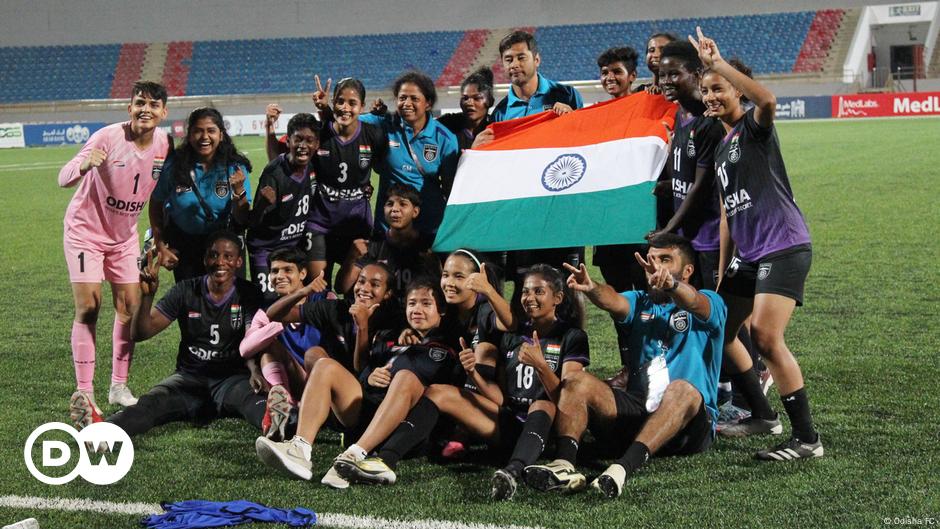Women’s football: Odisha putting India on the map

Women’s football: Odisha putting India on the map
Odisha became the first-ever Indian team, men’s or women’s, to reach the group stages of the Asian Champions League. The historic moment was achieved despite the women’s side only being formed in 2022.
Full Article
Odisha became the first-ever Indian team, men’s or women’s, to reach the group stages of the Asian Champions League. The historic moment was achieved despite the women’s side only being formed in 2022. The final whistle in Jordan first brought disbelief and then joy for the players and coaching staff of Odisha’s women football team. On a warm night in August 2024, the club created history as they became the first-ever Indian team, men’s or women’s, to reach the group stage of the Asian Champions League. “There are certain moments, you can’t justify with words,” head coach Crispin Chettri told DW. “It was very emotional for us. At the final while I didn’t even realize we had qualified. When our coaches and staff started celebrating, then I knew.” Reaching the inaugural AFC Champions League group stage, newly rebranded this year from the previously named AFC Women’s Championship, is even more impressive given Odisha’s women’s team was only founded in 2022. And the significance of the team’s achievement was not lost on co-captain Shreya Hooda. “As a team, we want to showcase the talent and potential of Indian women’s football and make our country proud,” she explained to DW. Odisha’s men’s side joined the Indian Super League (ISL) in 2014, and owner Rohan Sharma’s passion for women’s football ensured the formation of the women’s side in 2022 – six years after the Indian Women’s League (IWL) was launched. Sharma didn’t stop there though. He guaranteed equality for the men’s and women’s teams, providing the same state-of-the-art training facilities, nutritionists, and support staff. Hooda, India’s current No.1 between the posts, felt right from the start the club was the best place for her reach a new level. “I believed in their system the way the club presented it to me,” she said. “I believed in the coaching staff, and it was a huge opportunity for me to develop as a young goalkeeper.” It was a sentiment echoed by overseas signing Jennifer Kankam Yeboah, who joined Odisha in August 2024 – days after being named Ghana’s Female Footballer of the Year. Praising the club’s ambition and facilities, Yeboah added: “The coach’s vision and the conversations we had were key to me joining the club. He outlined how I would fit into the team’s plan and how he intended to develop my game.”
To view this video please enable JavaScript, and consider upgrading to a web browser that supports HTML5 video Reaching girls from small villages in the Eastern state that has a population of over 43 million is a real challenge, as Club President Raj Athwal pointed out. “In a country with such a huge population, you will still find hundreds of millions of people watching football (men’s and women’s),” Athwal told DW. “In the northeast, football is more popular than cricket. So, building our team wasn’t a process overnight, it took several months but the talent of the local players, even those coming from poorer backgrounds, was evident.” Nevertheless, in just their second season, 75% of Odisha’s team is made up of local girls. Chettri, 49, had never coached women’s football before and so had to adjust to the young, often inexperienced but talented women he was now in charge of. “Odisha used to be a hotbed for women’s football but it had not been happening recently, even though there was a lot of talent,” he explained. “The talent needed to be polished. I realized quickly that I had to stop coaching the players and first had to ask them to learn certain basics of the game. I had to make them aware of modern football, the tactical awareness in the game now. I started by educating them, then moved to the theory and showing them slides on how modern football is played.” The investment into players, facilities, and experienced coaching staff very quickly bore fruit as Odisha were crowned IWL champions in just their second season. Adopting a family-first mindset within the team and focusing less on individual talent resonated, as they won 10 of 12 league games, losing only once. Despite the inevitable departure of several key players following their maiden title, the new group of players quickly adapted to Chettri’s mantra and made history in the Asian Champions League. “The girls already have to fight so many obstacles, like the culture and society,” he said. “So mentally, they are already very strong. If I can then really motivate them, winning a football game is not impossible.” The growth and domestic success of women’s football in India has Chettri believing a spot at the World Cup for the country is coming sooner rather than later. “I believe with how much women’s football is growing, we have a lot more chances to reach the World Cup than the men’s side,” he said. “2031 is a realistic target.” Edited by: Jonathan Harding
